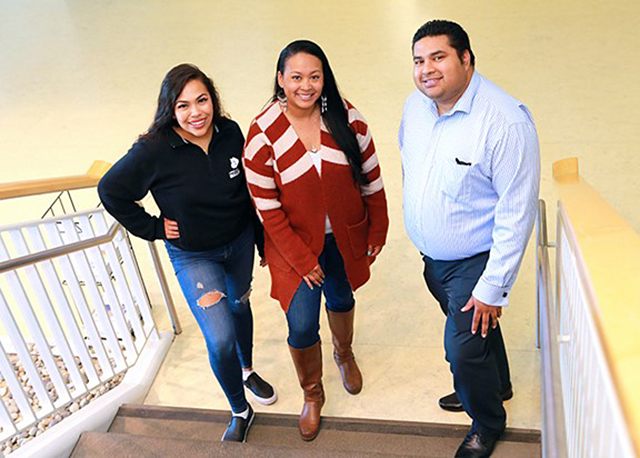EOPS: Offering “above and beyond” support for more than 50 years
Students’ frustration at losing a valued program for learners of color spurred lawmakers in 1969 to create today’s EOPS
One of College of San Mateo’s signature programs has helped some of the community’s most marginalized students realize their goals for more than 50 years.
Extended Opportunity Programs and Services (EOPS), established in 1969, gives marginalized and underserved students holistic support, counseling and practical help within an empowering “village” of staff and peers. In a region of great inequality where many students face multi-layered barriers to success, EOPS provides space for students to realize their potential.
“I would liken EOPS to a mirror,” said EOPS Counselor/Coordinator Patrice Reed-Fort. “In moments of challenge, we encourage our students to reflect on who they are, where they’ve come from and where they want to go.

“That helps them pause, reflect upon their journey and move forward by tapping into the brilliance that exists within them.”
EOPS follows the philosophy of a 1960s College of San Mateo innovation, the College Readiness Program, a holistic student support program. In 1969, state legislation funded and expanded EOPS to all community colleges in the state. These programs also helped inspire the college’s current range of learning communities, through which students find identity and strength in shared social and cultural experiences. Many such CSM communities, from Umoja to Mana, Puente and Writing in the End Zone, now collaborate with EOPS and follow its historical lead.
To join EOPS, students must be California residents, eligible for the California Community College Promise Grant, enrolled in 12 units (exceptions may apply), have completed less than 50 degree-applicable units at any college, and must be determined educationally disadvantaged per EOPS regulations.
Participants receive a critical safety net of resources and services, ranging from personal and academic counseling to childcare, food vouchers, transportation support, textbook assistance and much more. Each student is assigned a counselor, and has a dedicated team of staff committed to supporting them in achieving their academic, career and personal goals. The EOPS program remains dynamic and responsive to students’ needs.
One such example is the EOPS-cohorted math course sequence taught by Professor Angel Pilar. This cohorted sequence not only addresses EOPS students’ struggles with math, it also builds collective responsibility through learning as a community.
Reed-Fort knows EOPS works because she was an EOPS student herself.
“I returned to CSM in 2009 as a re-entry student with two children, ages two and three,” Reed-Fort said. “I knew returning to school would be a challenge.
“What initially attracted me was the tangible support,” she said. “As I grew to know the program more, it was the sense of community and the staff’s undeniable investment in my personal development and growth. While I was there, I felt I had a layer of support and protection. The counselors and staff truly believed in me and that was important especially in those moments when I didn’t believe in myself.”
Today, Reed-Fort and her team serve up to 400 students in EOPS, some with seemingly insurmountable challenges.
“We have to hold our students as whole human beings, not just in their academic identity,” Reed-Fort said. “Witnessing our students push through challenges and reach their goals is inspirational. That is most precious to me.”

